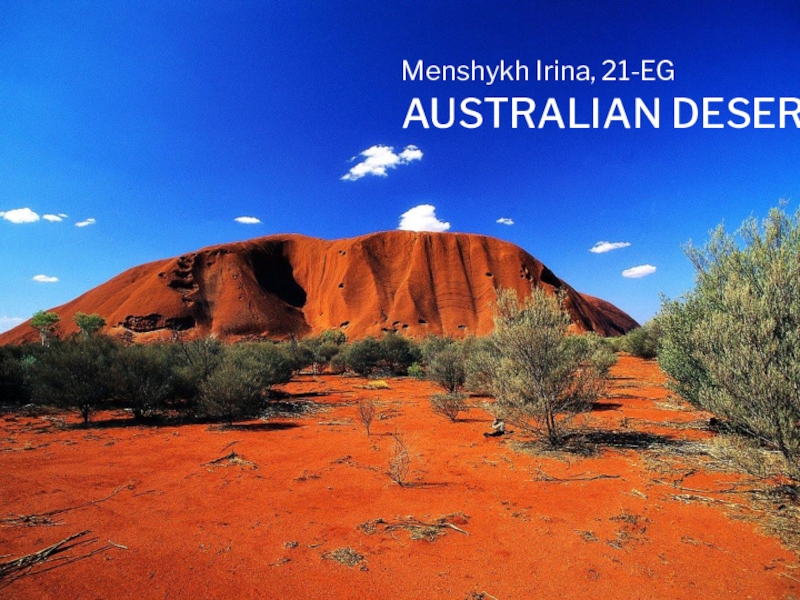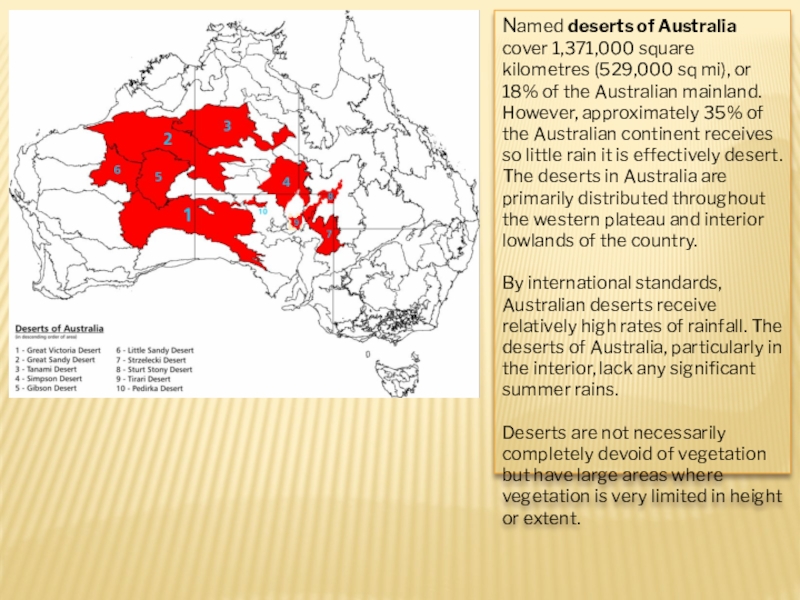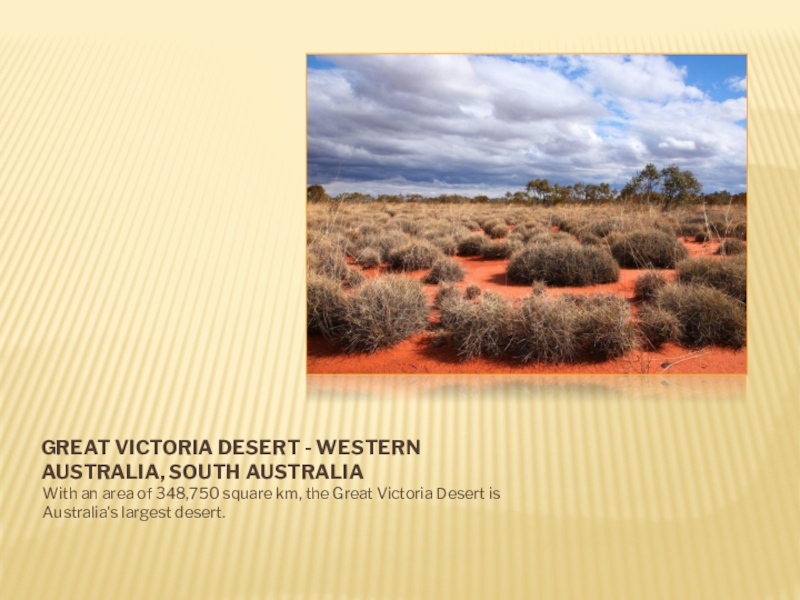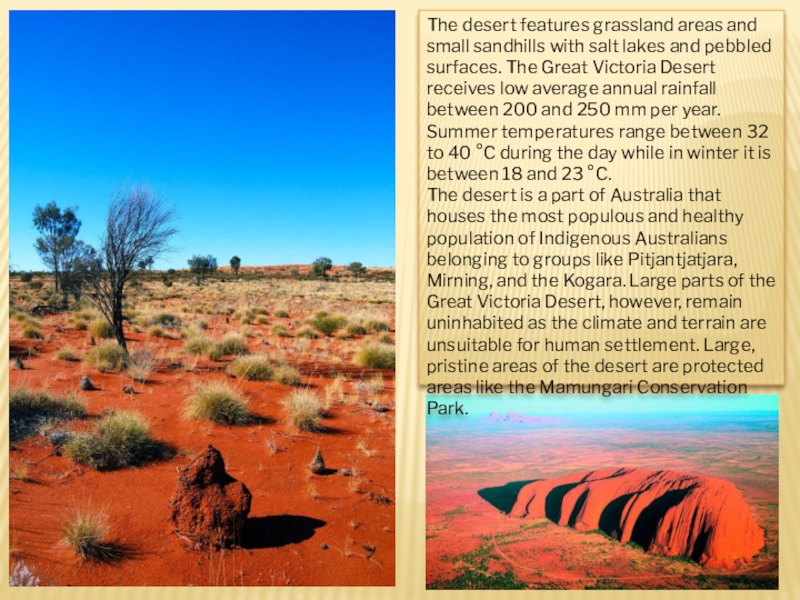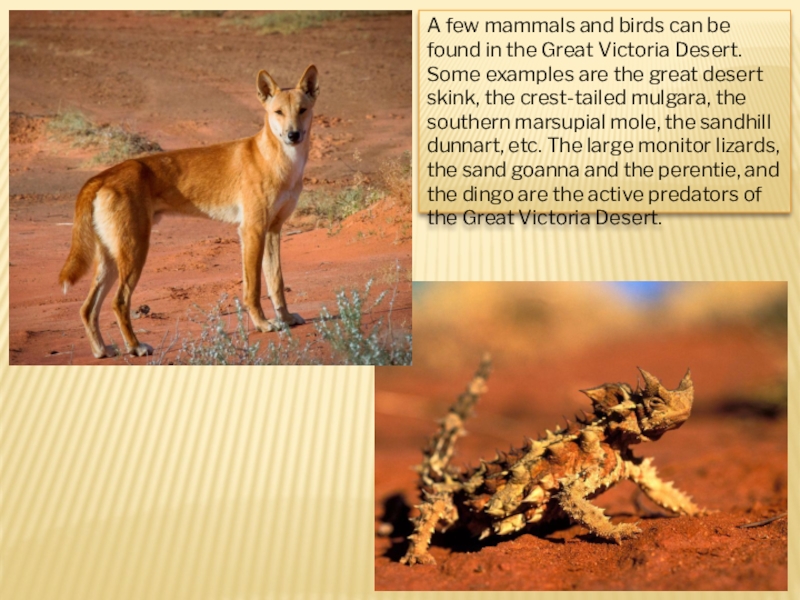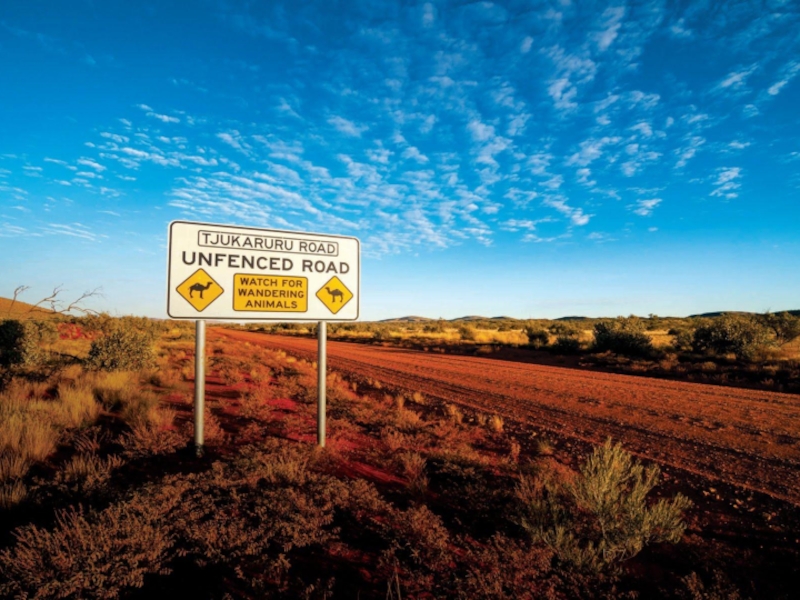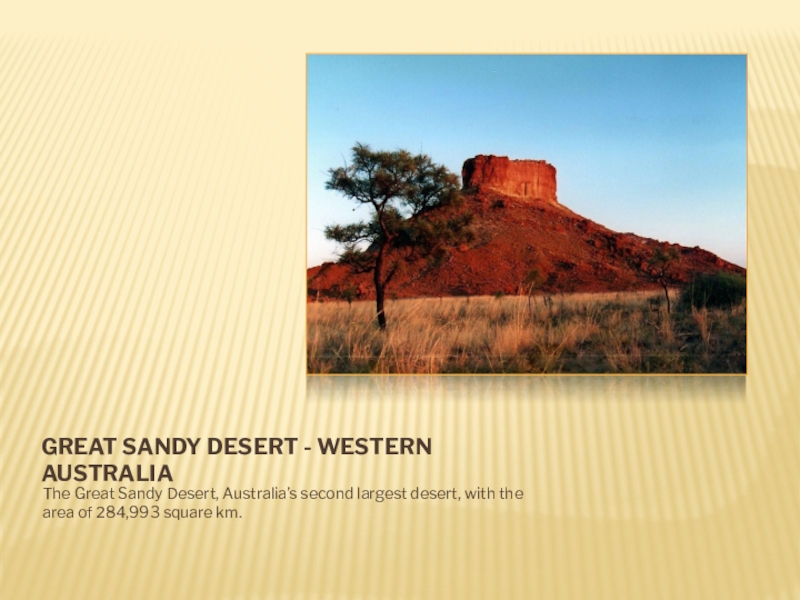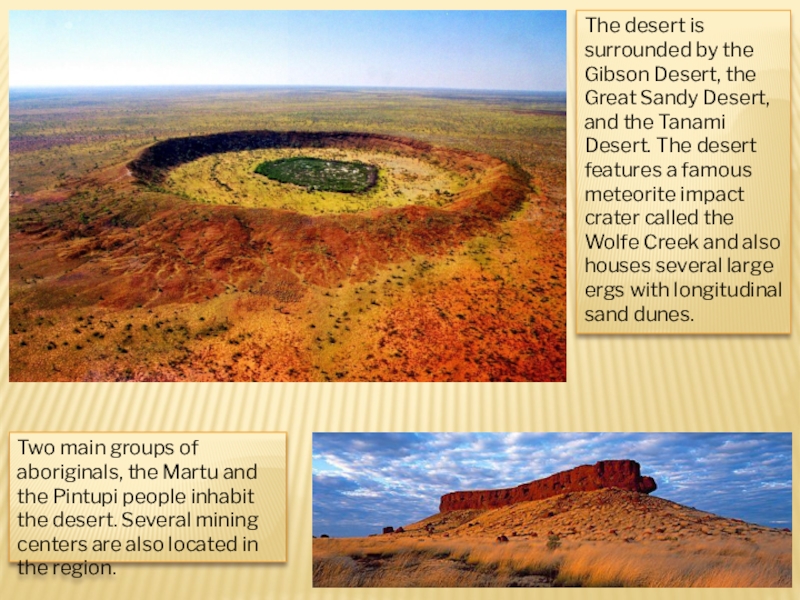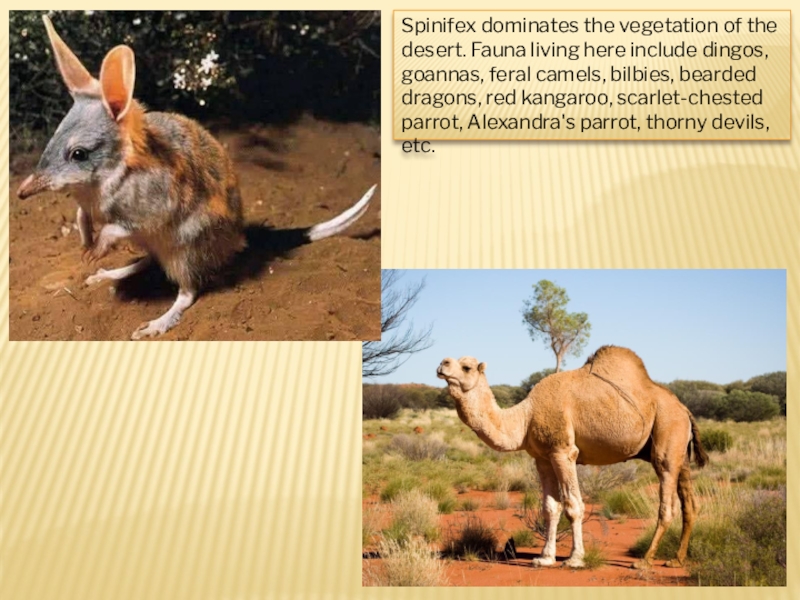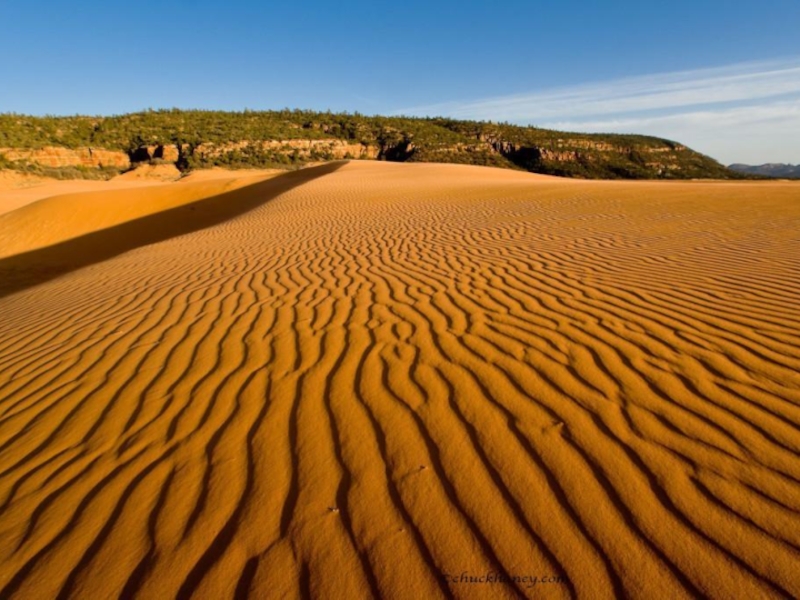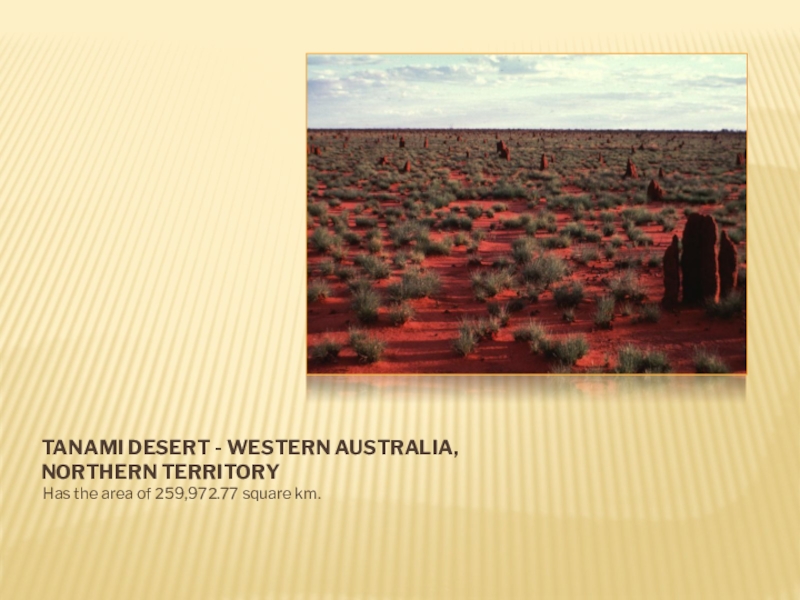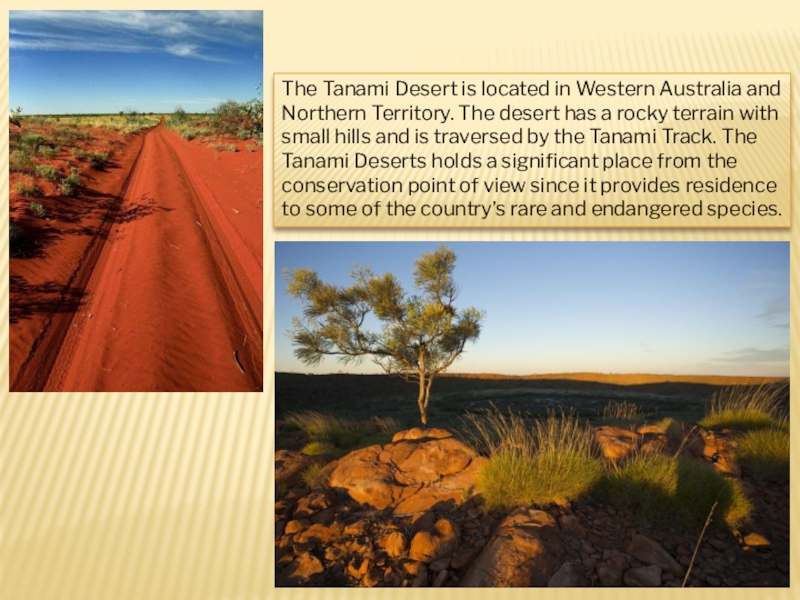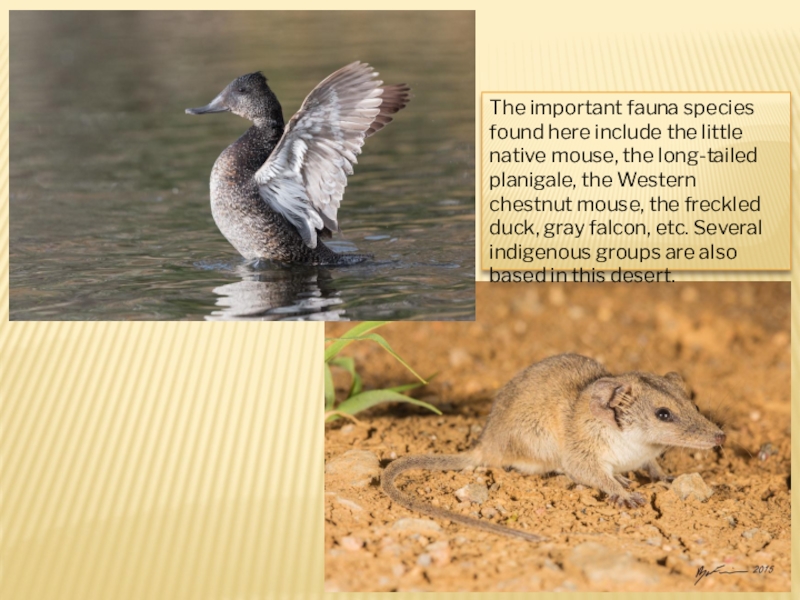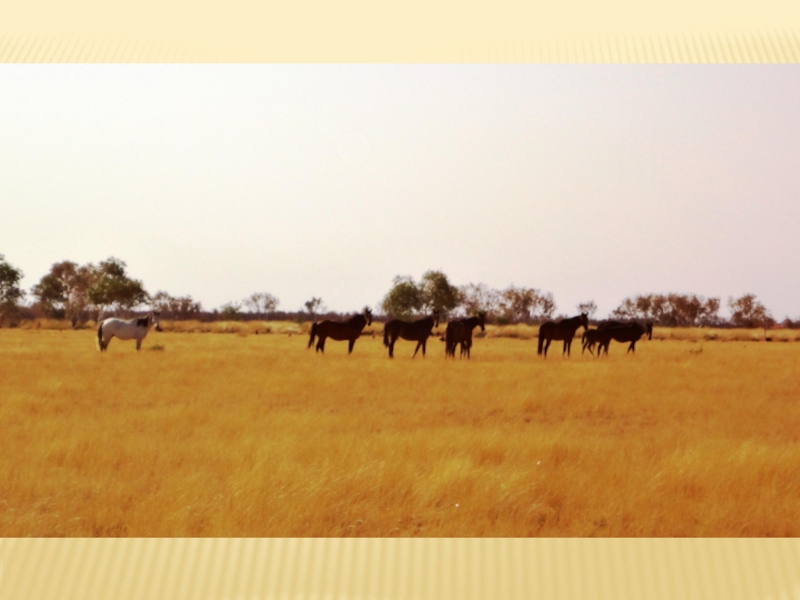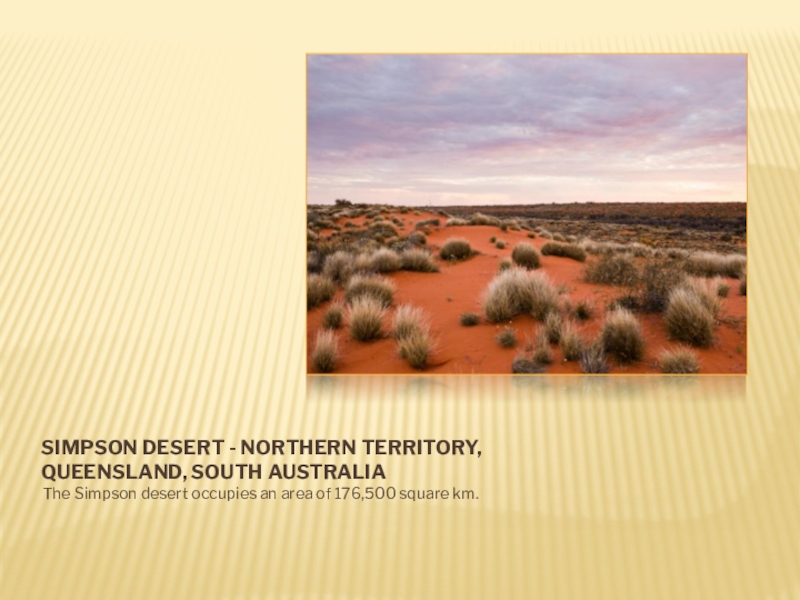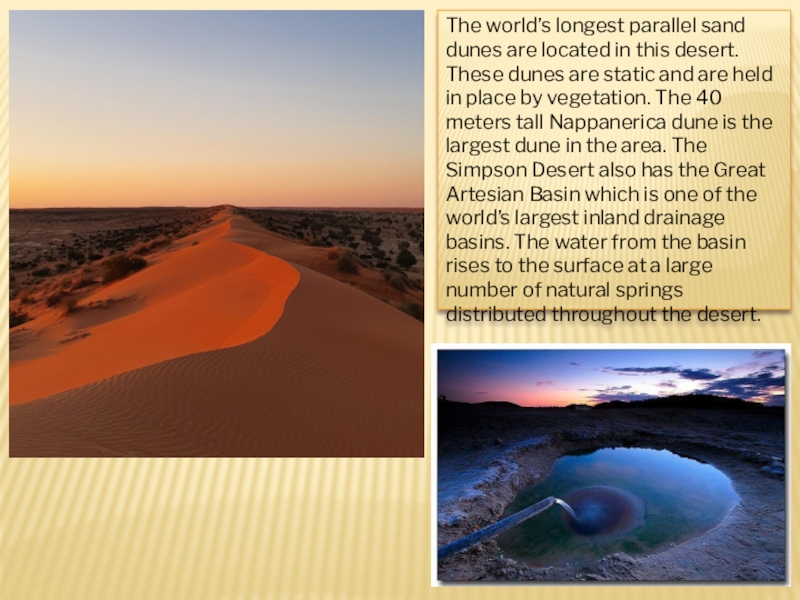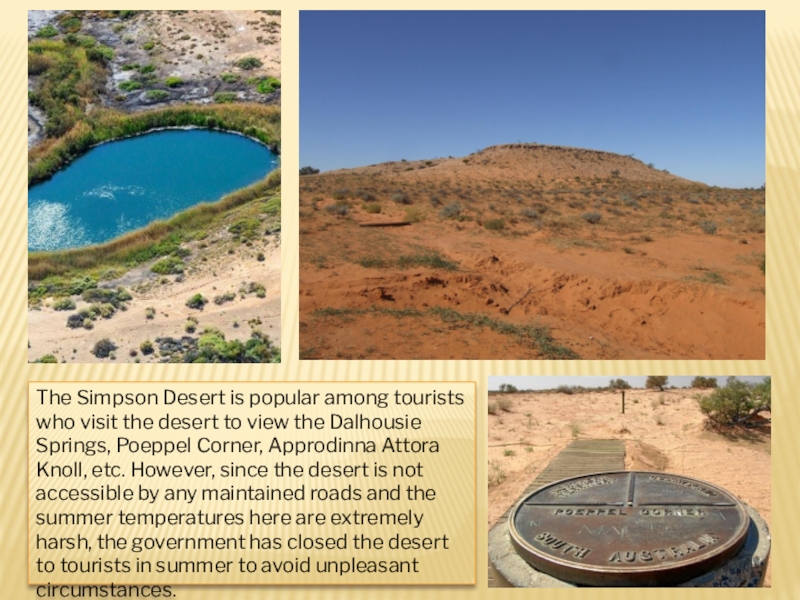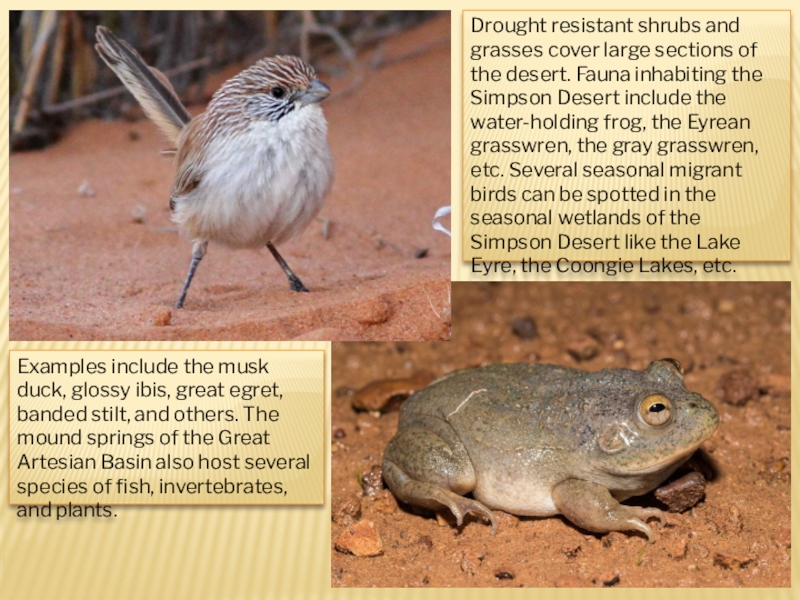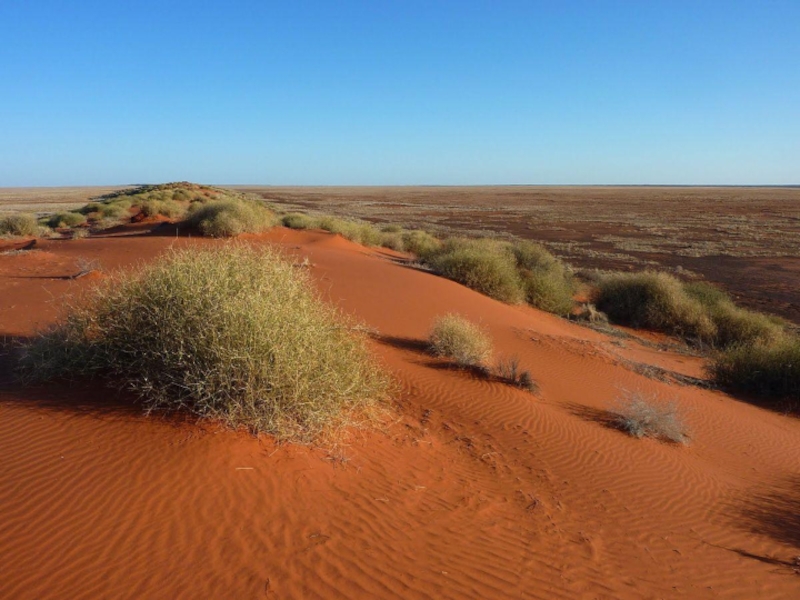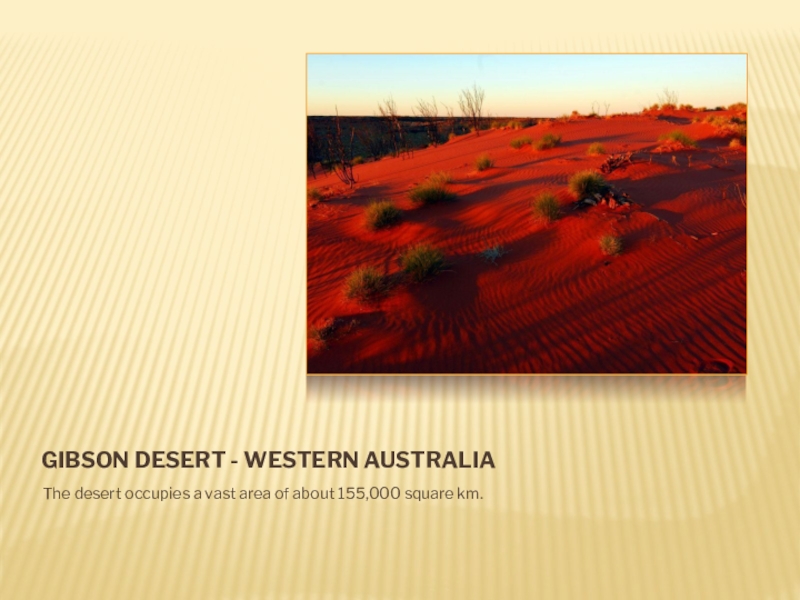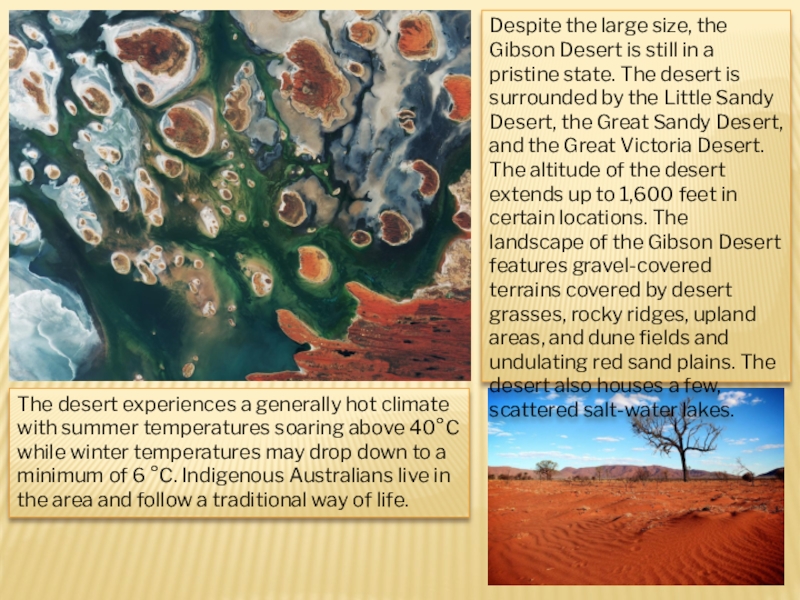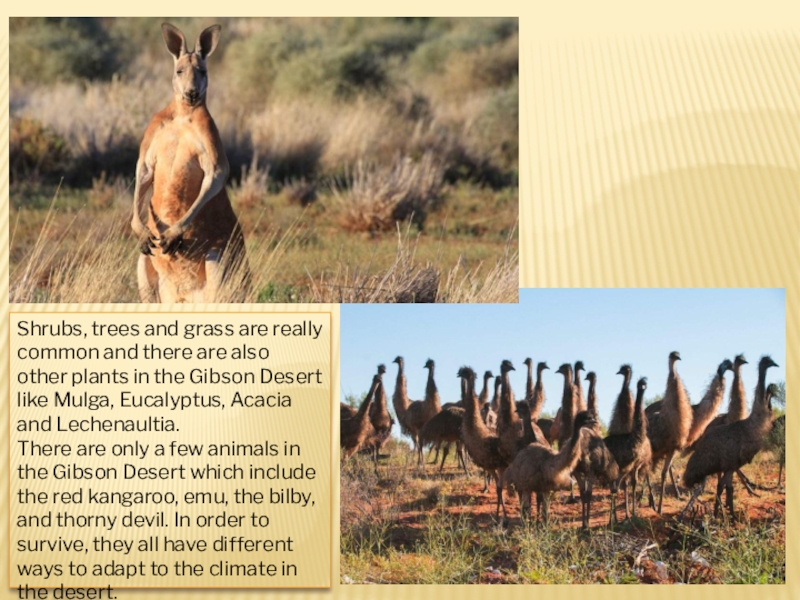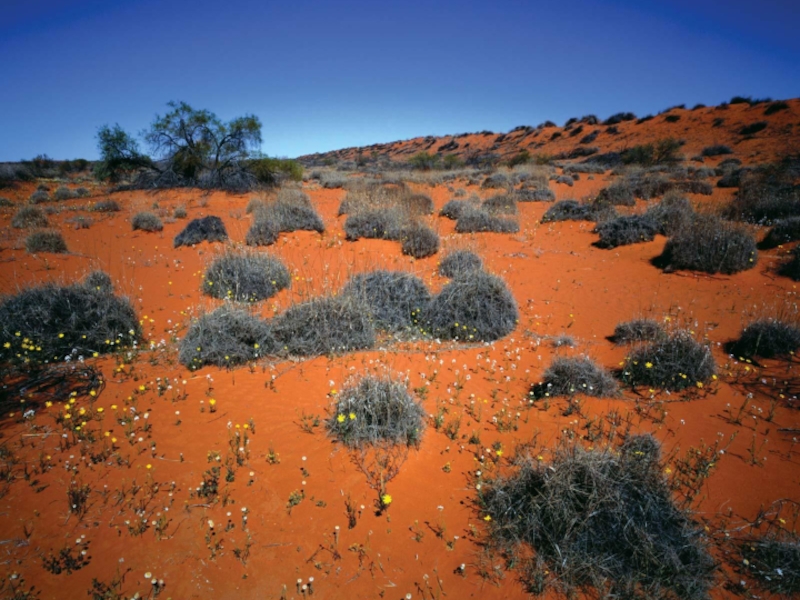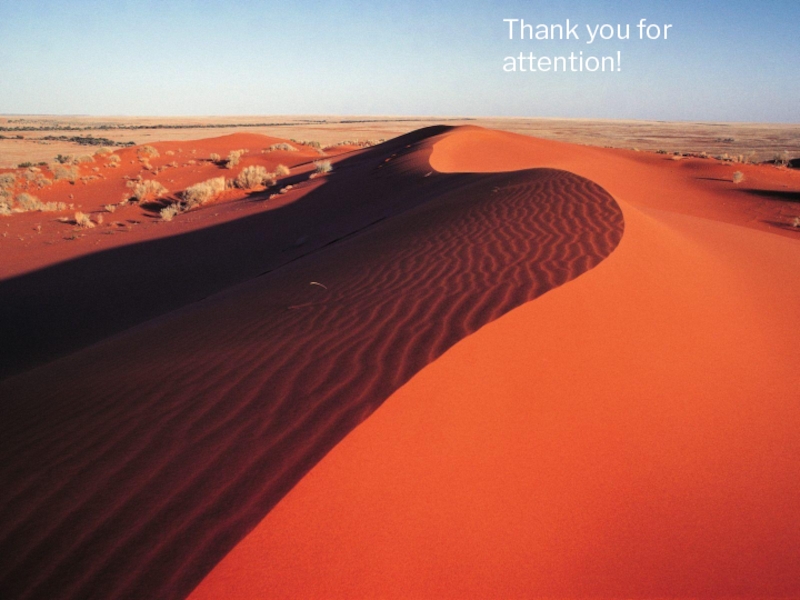Слайд 1Australian Deserts
Menshykh Irina, 21-EG
Слайд 2Named deserts of Australia cover 1,371,000 square kilometres (529,000 sq mi), or
18% of the Australian mainland. However, approximately 35% of the
Australian continent receives so little rain it is effectively desert. The deserts in Australia are primarily distributed throughout the western plateau and interior lowlands of the country.
By international standards, Australian deserts receive relatively high rates of rainfall. The deserts of Australia, particularly in the interior, lack any significant summer rains.
Deserts are not necessarily completely devoid of vegetation but have large areas where vegetation is very limited in height or extent.
Слайд 3Great Victoria Desert - Western Australia, South Australia
With an area
of 348,750 square km, the Great Victoria Desert is Australia's
largest desert.
Слайд 4The desert features grassland areas and small sandhills with salt
lakes and pebbled surfaces. The Great Victoria Desert receives low
average annual rainfall between 200 and 250 mm per year. Summer temperatures range between 32 to 40 °C during the day while in winter it is between 18 and 23 °C.
The desert is a part of Australia that houses the most populous and healthy population of Indigenous Australians belonging to groups like Pitjantjatjara, Mirning, and the Kogara. Large parts of the Great Victoria Desert, however, remain uninhabited as the climate and terrain are unsuitable for human settlement. Large, pristine areas of the desert are protected areas like the Mamungari Conservation Park.
Слайд 5A few mammals and birds can be found in the
Great Victoria Desert. Some examples are the great desert skink,
the crest-tailed mulgara, the southern marsupial mole, the sandhill dunnart, etc. The large monitor lizards, the sand goanna and the perentie, and the dingo are the active predators of the Great Victoria Desert.
Слайд 7Great Sandy Desert - Western Australia
The Great Sandy Desert, Australia’s
second largest desert, with the area of 284,993 square km.
Слайд 8The desert is surrounded by the Gibson Desert, the Great
Sandy Desert, and the Tanami Desert. The desert features a
famous meteorite impact crater called the Wolfe Creek and also houses several large ergs with longitudinal sand dunes.
Two main groups of aboriginals, the Martu and the Pintupi people inhabit the desert. Several mining centers are also located in the region.
Слайд 9Spinifex dominates the vegetation of the desert. Fauna living here
include dingos, goannas, feral camels, bilbies, bearded dragons, red kangaroo,
scarlet-chested parrot, Alexandra's parrot, thorny devils, etc.
Слайд 11Tanami Desert - Western Australia, Northern Territory
Has the area of
259,972.77 square km.
Слайд 12The Tanami Desert is located in Western Australia and Northern
Territory. The desert has a rocky terrain with small hills
and is traversed by the Tanami Track. The Tanami Deserts holds a significant place from the conservation point of view since it provides residence to some of the country’s rare and endangered species.
Слайд 13The important fauna species found here include the little native
mouse, the long-tailed planigale, the Western chestnut mouse, the freckled
duck, gray falcon, etc. Several indigenous groups are also based in this desert.
Слайд 15Simpson Desert - Northern Territory, Queensland, South Australia
The Simpson desert
occupies an area of 176,500 square km.
Слайд 16The world’s longest parallel sand dunes are located in this
desert. These dunes are static and are held in place
by vegetation. The 40 meters tall Nappanerica dune is the largest dune in the area. The Simpson Desert also has the Great Artesian Basin which is one of the world’s largest inland drainage basins. The water from the basin rises to the surface at a large number of natural springs distributed throughout the desert.
Слайд 17The Simpson Desert is popular among tourists who visit the
desert to view the Dalhousie Springs, Poeppel Corner, Approdinna Attora
Knoll, etc. However, since the desert is not accessible by any maintained roads and the summer temperatures here are extremely harsh, the government has closed the desert to tourists in summer to avoid unpleasant circumstances.
Слайд 18Drought resistant shrubs and grasses cover large sections of the
desert. Fauna inhabiting the Simpson Desert include the water-holding frog,
the Eyrean grasswren, the gray grasswren, etc. Several seasonal migrant birds can be spotted in the seasonal wetlands of the Simpson Desert like the Lake Eyre, the Coongie Lakes, etc.
Examples include the musk duck, glossy ibis, great egret, banded stilt, and others. The mound springs of the Great Artesian Basin also host several species of fish, invertebrates, and plants.
Слайд 20Gibson Desert - Western Australia
The desert occupies a vast area
of about 155,000 square km.
Слайд 21Despite the large size, the Gibson Desert is still in
a pristine state. The desert is surrounded by the Little
Sandy Desert, the Great Sandy Desert, and the Great Victoria Desert. The altitude of the desert extends up to 1,600 feet in certain locations. The landscape of the Gibson Desert features gravel-covered terrains covered by desert grasses, rocky ridges, upland areas, and dune fields and undulating red sand plains. The desert also houses a few, scattered salt-water lakes.
The desert experiences a generally hot climate with summer temperatures soaring above 40°C while winter temperatures may drop down to a minimum of 6 °C. Indigenous Australians live in the area and follow a traditional way of life.
Слайд 22Shrubs, trees and grass are really common and there are
also other plants in the Gibson Desert like Mulga, Eucalyptus,
Acacia and Lechenaultia.
There are only a few animals in the Gibson Desert which include the red kangaroo, emu, the bilby, and thorny devil. In order to survive, they all have different ways to adapt to the climate in the desert.
